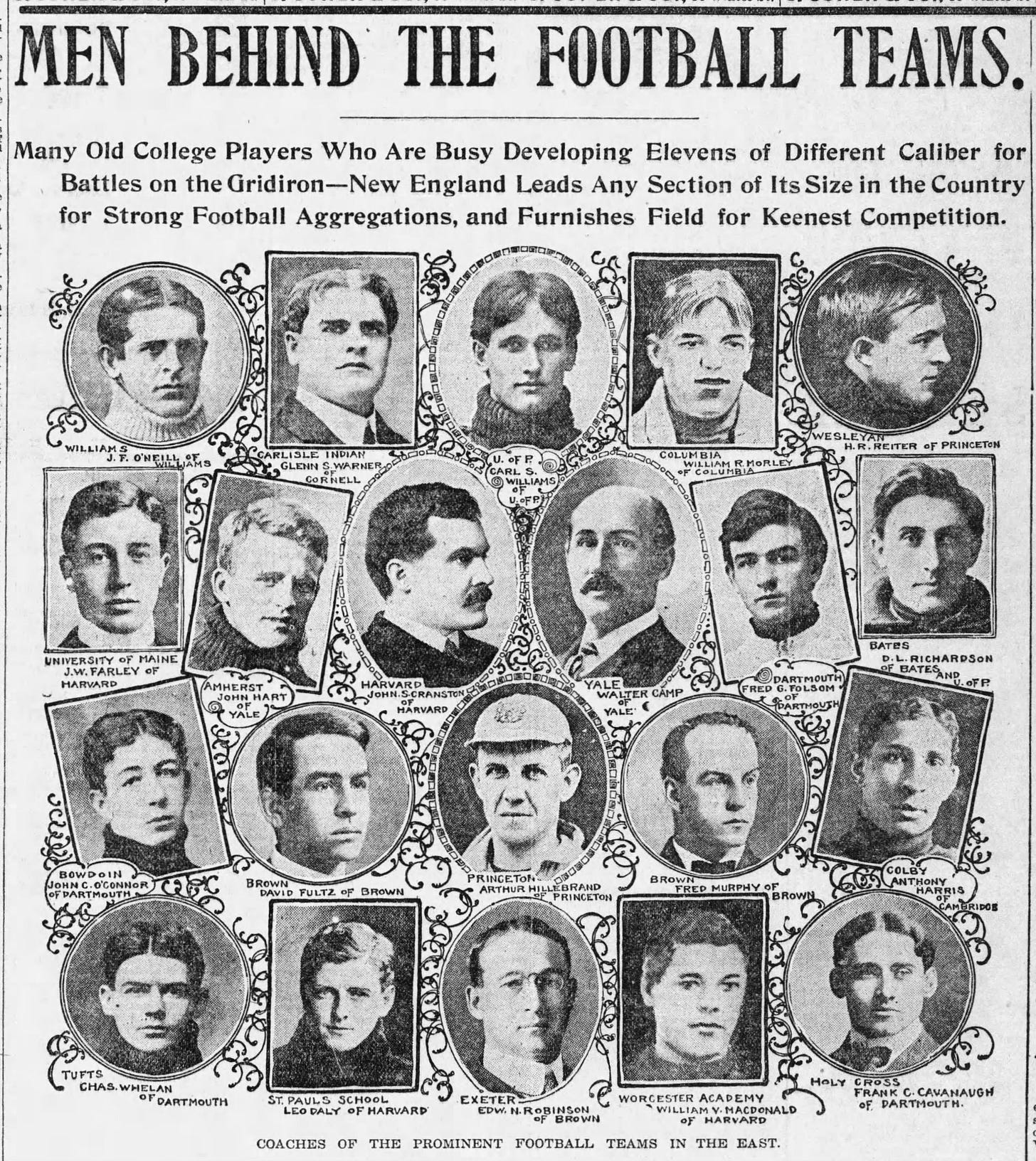Today's Tidbit: Eastern Coaches Of 1903
Through football's first 50 or more years, Eastern teams dominated the sport and Eastern players dominated the game's coaching ranks. Eastern schools would not have considered hiring as a coach someone who had been trained outside the East, and schools further west and south hired Easterners as well. Many or most of the top coaches responsible for the rise of Western (aka Midwestern) and Southern football, such as Stagg, Williams, and Heisman, played at Eastern schools. The next generation of top coaches in the other regions often played for coaches who were Easterners.
So, when I came across the composite picture of the Eastern coaches of 1903 shown below, I thought it would be fun to see what became of each of them. They are listed below by row and left to right. The schools they played for are in parentheses.
Williams: J. F. O'Neill (Williams)
Frank "Buck' O'Neill served as head coach at Colgate, Williams, Syracuse, and Columbia until 1922. Also coached the Syracuse Athletic Club in the 1902 World Series of football.
Carlisle Indian: Glenn Warner (Cornell)
Football royalty. No additional information is required.
Penn: Carl S. Williams (Penn)
Coached Penn from 1902 to 1907, winning national championships in 1904 and 1907.
Columbia: William R. Morely (Columbia)
A three-time All-American, Bill Morely coached Columbia from 1902 to 1905.
Wesleyan: H. R. Reiter (Princeton)
Ritter played early pro football after Princeton, then coached Wesleyan and Lehigh until 1911.
Maine: J. W. Farley (Harvard)
Farley coached Maine in 1901 and 1903 and handled Harvard in 1902.
Amherst: John Hart (Yale)
Hart coached Texas in 1902 and Amherst in 1903.
Harvard: John S. Cranston (Harvard)
Named to the first All-American team in 1889, Cranston was the first player to wear a nose guard. The 1903 season at Harvard was his only turn as head coach.
Yale: Walter Camp (Yale)
Football royalty. No additional information is required.
Dartmouth: Fred G. Folsom (Dartmouth)
Coached Colorado and Dartmouth until 1915. Colorado's Folsom Field is named in his honor. He also invented the bucking strap.
Bates: D. L. Richardson (Bates and Penn)
The 1903 season appears to have been his only turn at coaching By 1910, he was a hospital administrator in Providence.
Bowdoin: John C. O'Connor (Dartmouth)
O'Connor coached Bowdoin, Virginia Tech, and Dartmouth until 1908 before focusing on his medical practice.
Brown: David Fultz (Brown)
Played seven seasons of MLB and three years of early pro football. Coached at Missouri, Lafayette, Brown, NYU, and Columbia until 1911. A lawyer, he later became president of baseball's International League.
Princeton: Arthur Hillebrand (Princeton)
Hillebrand coached Navy in 1901 and 1902 before taking over at Princeton from 1903 to 1905. His 1903 team won the national championship.
Brown: Fred Murphy (Brown)
Murphy coached UMass in 1899 and 1900, Missouri in 1900 and 1901, and assisted at Brown in 1903. He and Dave Fulz practiced law and refereed college football together after their coaching days.
Colby: Anthony Harris (Cambridge Manual / Tufts)
Harris is the subject of tomorrow's Tidbit but was among the first Black head coaches of a predominantly White college team.
Tufts: Charles Whelan (Dartmouth)
Whelan coached Tufts from 1903 to 1907, 1912 to 1917, and 1919. He led Boston U. from 1921 to 1925. He was also a physician and radiology pioneer.
St. Paul's School: Leo Daly (Harvard)
Daly graduated from Harvard in 1903, coached St. Paul's that fall, and assisted at Harvard in 1905 and, perhaps, other years.
Exeter: Edward N. Robinson (Brown)
Head coach at Nebraska, Brown, Maine, Phillips Exeter, Brown. Tufts, Brown, Boston U, and Providence Steam Roller until 1931. Coached a test game in 1925 with 40-play quarters rather than a 15-minute clock.
Worcester Academy: William V. MacDonald (Harvard)
MacDonald does not appear to have coached after the 1903 season.
Holy Cross: Frank C. Cavanaugh (Dartmouth)
Coached Cincinnati, Denver Athletic Club, Holy Cross, Worchester Academy, Dartmouth, Boston College, and Fordham until 1932. Cavanaugh is best known for inventing grass drills.
Several of the coaches included in the composite had long, successful coaching careers, others coached for a time while attending graduate or professional school, and a few coached only a season or two. But each was special because they coached an Eastern school when their region dominated football.
Football Archaeology is reader-supported. Click here to buy one of my books or otherwise support the site.



Great history bios on these storied coaches!
Cavanaugh was known as "The Iron Major" for his exploits during WWI, in which he was severely wounded.